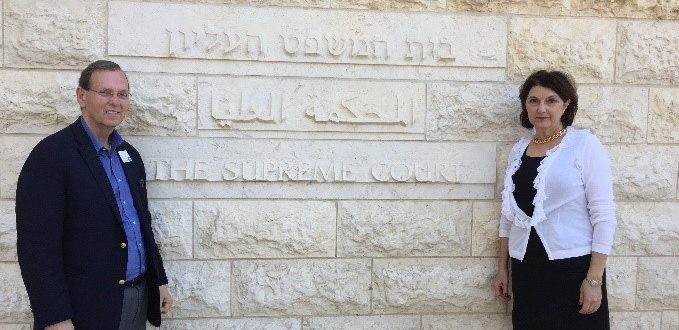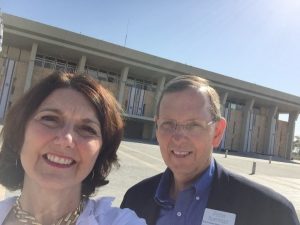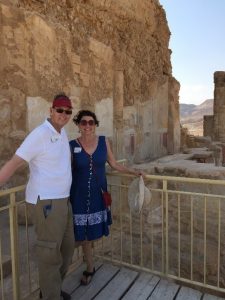Travel the World: 10-day trip to Palestine and Israel

Through the World Affairs Council of Philadelphia, a group of 22 United States citizens traveled throughout Palestine and Israel for 10 days with the Travel the World program. The trip featured expert tour leadership and content, like-minded fellow travelers, advanced reading materials, and substantive in-country briefings. All of these pieces add up to a puzzle that helps to experience a culture different from your own.
The trip included two members of the World Affairs Council – Cincinnati and Northern Kentucky who have been members since 2006, Dr. Peter and Debra Ruehlman. “Everyone was conscientious, and had clearly read up in advance,” said Peter. He and Debra knew the trip would not be a “typical” vacation. The days were long, sometimes beginning at 6 am and returning to rest by 10 pm.
“While the trip was eye-opening in what we saw, it was really mind-opening in what we experienced,” continued Debra. “We met and had discussions with people from many areas of life – government officials, university students, teachers, religious leaders and ordinary citizens like us. That’s what made it a World Affairs Council trip. It wasn’t just a tour to see sites in the Holy Land. We really got to hear different points of view on the same issues, both Israeli and Palestinian.”
They experienced things you hear about in the news – they didn’t just see the Golan Heights, they talked with UN Peacekeepers on patrol. They heard gunfire from just a few miles away in Syria.

The Ruehlman’s at the Knesset, after briefings and discussions with several government officials.
Israel is a complex place, according to the Ruehlmans. “20% of the population are Arab-Israeli citizens, people who are oppressed. That was hard to witness.” They visited the Knesset (the Israeli parliament), and had a special briefing with David Keyes, a government media spokesperson. They visited the Supreme Court and met with a former justice. And behind the walls of a refugee camp, they met with people who yearn for a Palestinian homeland. “These interactions were organized by people with real relationships. Our US tour leaders knew the people with whom we met. We were able to debate and ask questions,” said Debra. “No topic was off limits.”
Of course, sightseeing was a part of the itinerary. “Everywhere you go, you cannot help but see places of the past: Bethlehem, Nazareth, Hebron, Cana, Galilee, the Dead Sea and others. Seeing these places was not just through a Biblical lens, but a lens of what it’s like to live there today” said Debra.
While visiting the Jordan River, Peter noted that “Water is gold in that part of the world,” The Jordan River is significant to many religions for different reasons. Debra was shocked at the size of the river, comparing its width to the Little Miami River here in Cincinnati.
In Jerusalem – the Holy City for all – Christians, Muslims and Jews – the group visited old markets and lavished in the land valued by many, learning local customs along the way. A machine-gun carrying soldier on the Temple Mount told Debra to cover her arms – a head covering and long skirt were not enough on that hot day. At the Western Wall, also known as the Wailing Wall, men and women were separated, with different gender-specific head coverings provided if you didn’t have your own.

The trip was not all study and briefings, here they are at Masada, near the Dead Sea.
Peter noted the Masada National Park in the Judean desert as a high point. Masada is known for its sophisticated palace and water system that could sustain over 1,000 people for two to three years. Some of the travelers, including Debra, took the opportunity to float in the Dead Sea – an otherworldly experience!
During their travels, many meals were prepared just for the visitors, consisting of grains, many forms of hummus, pita bread, vegetables, meat, and wine. “The food was terrific! We were able to try food of the region that we had never tried before,” said Debra.
According to Debra, “It wasn’t a vacation, it wasn’t a holy pilgrimage. It was truly a study tour. We were able to see experiences from both sides. We saw our Palestinian tour guide leave the tour bus, forced to walk through every checkpoint, while armed Israelis boarded the bus and checked us. On the other hand, our Jewish-American leader was not allowed into a mosque for security reasons. That’s conflict brought to life.”
The Ruehlmans are still processing their trip, even months after returning home. And now, as the political situation heats up with the US Embassy announcement, their first-hand knowledge of Jerusalem and the region makes it so much more relevant.
When asked to give advice on this experience, they had more than enough to share. Our conversation concluded with this thought from the Ruehlmans.
“We encourage others to expand your horizons. But you must be willing to go outside of your comfort zone, have curiosity, and be able to endure. We experienced uncertainty from time to time, but there was never a time that we felt unsafe.”
Thank you to the Ruehlmans for sharing these experiences abroad.
To learn more about other travel opportunities visit the World Affairs Council of Philadelphia.


